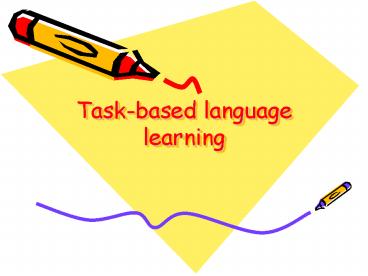Task-based language learning - PowerPoint PPT Presentation
Title:
Task-based language learning
Description:
Task-based language learning Definition: Task-based language learning (TBLL), also known as task-based language teaching (TBLT) or task-based instruction (TBI ... – PowerPoint PPT presentation
Number of Views:194
Avg rating:3.0/5.0
Title: Task-based language learning
1
Task-based language learning
2
Definition
- Task-based language learning (TBLL), also known
as task-based language teaching (TBLT) or
task-based instruction (TBI) focuses on the use
of authentic language and on asking students to
do meaningful tasks using the target language.
Such tasks can include visiting a doctor,
conducting an interview, or calling customer
service for help. Assessment is primarily based
on task outcome (in other words the appropriate
completion of tasks) rather than on accuracy of
language forms. This makes TBLL especially
popular for developing target language fluency
and student confidence.
3
The core
- The core of the lesson is the task. All parts of
the language used are deemphasized during the
activity itself, in order to get students to
focus on the task.
4
Pre-task
- In the pre-task, the teacher will present what
will be expected of the students in the task
phase. Additionally, the teacher may prime the
students with key vocabulary or grammatical
constructs, although, in "pure" task-based
learning lessons, these will be presented as
suggestions and the students would be encouraged
to use what they are comfortable with in order to
complete the task. The instructor may also
present a model of the task by either doing it
themselves or by presenting picture, audio, or
video demonstrating the task.
5
Task
- During the task phase, the students perform the
task, typically in small groups, although this is
dependent on the type of activity. - the teacher's role is typically limited to one of
an observer or counselor.
6
Planning
- Having completed the task, the students prepare
either a written or oral report to present to the
class. The instructor takes questions and
otherwise simply monitors the students
7
Report
- The students then present this information to the
rest of the class. Here the teacher may provide
written or oral feedback, as appropriate, and the
students observing may do the same.
8
Advantages
- Task-based learning is advantageous to the
student because it is more student-centered,
allows for more meaningful communication, and
often provides for practical extra-linguistic
skill building. - Furthermore, as the tasks are likely to be
familiar to the students (eg visiting the
doctor), students are more likely to be engaged,
and motivated.
9
Disadvantages
- There have been criticisms that task-based
learning is not appropriate as the foundation of
a class for beginning students. - Others claim that students are only exposed to
certain forms of language, and are being
neglected of others, such as discussion or
debate.
10
2. CLIL and TBL together How can tasks
help?
- There is a rich literature on TBL which can be
applied to the problems of CLIL . - Tasks have to be about something and Content can
provide the topics. - Content has be broken down into activities that
learners can engage with, and these fit our
definition of a Task.
11
CLIL through Tasks
- Do Coyle lists Task design in her curriculum
planning model and stresses the need for a
strategy for promoting genuine communication in
the FL if learning is to take place. - Tasks can be the main strategy
- She adds The CLIL environment demands a level
of talking and interaction that is different from
the traditional language classroom. - Tasks provide opportunities for genuine
communication and rich meaning-focused interaction
12
Characteristics of effective tasks
- have a primary focus on meaning
- have a clear outcome for learners to achieve
- relate as far as possible to real world
activities - engage learners interest
13
2.2.1. Task-based learning
? Activity / task / project ? Final product ?
Activity sequence / integrated activity
description
14
2.2.1. Task-based learning
Mathematics Elaborar e interpretar informaciones
estadísticas teniendo en cuenta la adecuación de
las tablas y gráficas empleadas y analizar si los
parámetros son más o menos significativos. 3rd
year ESO
Social Sciences Analizar el crecimiento de las
áreas urbanas, la diferenciación funcional del
espacio urbano y alguno de los problemas que se
les plantean a sus habitantes, aplicando este
conocimiento a ejemplos de ciudades españolas.
2nd year ESO
Natural Sciences Interpretar algunos fenómenos
naturales mediante la elaboración de modelos
sencillos y representaciones a escala del sistema
solar y de los movimientos relativos entre la
luna, la tierra y el sol. 1st year

